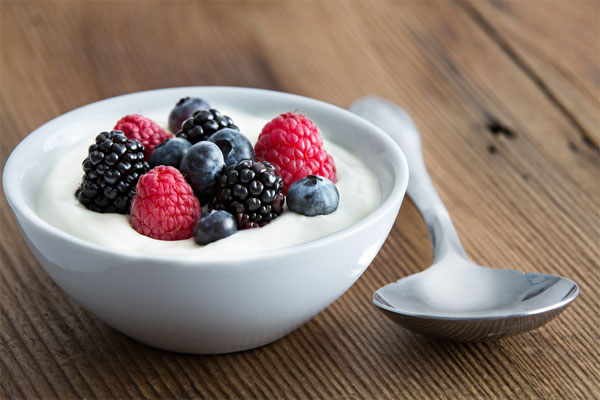Yogurt and Your Health

If you’ve been to the grocery store lately, you’ve probably seen the many different kinds of yogurt in the dairy case. You might even be eating some of those yogurts. Besides being a convenient snack, yogurt tastes good and is good for your health – as long as you know what to look for and what to steer clear of.
The Good
Yogurt provides important nutrients that we all need for good health. These include:
- Calcium
- Protein
- Potassium
- Magnesium
- Vitamin B-12
- Vitamin B-2
Protein and magnesium are especially beneficial for people who have diabetes. Protein helps maintain lean muscle mass, helps you feel more full, and can even out blood sugar levels. Magnesium helps improve insulin sensitivity, which can also help improve blood sugar levels.
Besides providing these nutrients, yogurt is an excellent source of probiotics, or “good” bacteria. Research shows that probiotics can boost your immune system, improve digestion, help with urinary tract infections and ease skin conditions like eczema.
The Bad
Many types of yogurt are loaded with sugar. Because yogurt is made from milk, it naturally contains a type of sugar called lactose. Added fruit also contains sugar. Additionally, food manufacturers often add extra sugar in the form of high fructose corn syrup, sugar, maple syrup or honey.
Artificial sweeteners, such as aspartame, sucralose and stevia, are generally added to light-style yogurts. These sweeteners can help lower the carbohydrate content of the yogurt, but some people avoid them.
Saturated fat is found in whole-milk and lower-fat yogurts. Some research indicates that saturated fat may not be as harmful as once thought.
You might also find other ingredients in your yogurt, like gelatin, artificial flavorings and food coloring. These aren’t necessarily harmful either, but if you have a question about if a food is right for you, speak with your health care provider.
How To Choose A Yogurt
- Look for a statement on the container that reads, “Contains live and active cultures.” This ensures that the yogurt contains probiotics.
- Skip yogurt that lists sugar as the first or second ingredient.
- Don’t buy flavored or fruited yogurt (which might not even contain real fruit). Instead, buy plain or vanilla yogurt and add your own fresh fruit.
- Try to choose a yogurt with less than 1.5 grams of saturated fat per serving.
- If you’re looking for more protein, choose a Greek-style yogurt or skyr, which is an Icelandic yogurt that is milder than regular yogurt, but also high in protein.
- Look for a yogurt that contains at least 15% of the daily value for calcium.

